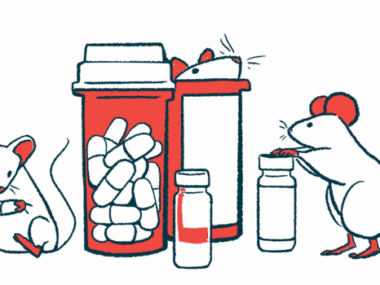As a Sanfilippo Caregiver, Summer Means a Changing of the Rings
Written by |

I look down at my hand and back at my face in the mirror. It’s time. I sigh and take off the diamond and white gold wedding band that I love and place it, lovingly, carefully, into my jewelry box. Then, from the same box, I pull a silver-colored silicon band and place it on my left ring finger.
I have just clocked in for my full-time summer caregiving role.

For columnist Valerie Tharp Byers, changing her rings means changing her identity for the summer. (Photo by Valerie Tharp Byers)
As I discussed last June, summer is the most exhausting time of year for me. Every aspect of my life must conform to my son’s benefit and safety. That even means removing my wedding ring so I don’t accidentally scratch him.
Will has Sanfilippo syndrome, and from dawn until dusk, his caregiving needs fall primarily on my shoulders — shoulders that desperately need more weight training because Will is going through puberty. At 5-foot-2 and 101 pounds, my “little” boy’s sheer size, coupled with his strength and activity level, have added an extra level of complexity to his care. And after last year’s back pain incident, I take the physicality of caregiving very seriously.
As much as I love the time I have with my son, taking my responsibility seriously doesn’t negate the toll that full-time caregiving takes. Will relies entirely on me for his personal care, feeding, transport, skill practice, and entertainment. All of my other responsibilities and activities take a back seat.
I’m unable to complete any work unless it’s after he goes to bed or in the wee hours of the morning before he wakes up. I often become lost in the task of caregiving, sacrificing opportunities to do activities I’d enjoy on my own, because I’m either too tired or feel selfish for taking time for myself when I could be using it to catch up around the house, make headway on work projects, spend one-on-one time with my daughter, or even just sit with my husband. During the summer months, I feel like I lose part of my identity.
I’m often asked why we don’t “just hire a respite worker.” Unfortunately, it’s not that easy. While we do have funds for respite care, workers must meet state requirements and be willing to undergo training to provide the extensive care Will requires. Those who have the skill set often want full-time, year-round employment, which is something we can’t provide. Those who are looking for part-time work typically don’t have the skill set necessary for his care or don’t wish to engage in some of his caregiving tasks.
This is not meant to be a “woe is me, my life is so hard” column. Nor is it meant to insinuate that Will is any type of burden; he’s my world. It’s just a reminder of the daily difficulty and regular sacrifices caregivers all over the world face and why they need support from friends, family, and social services. Every aspect of caregivers’ lives are affected by our role, from our eating and sleeping schedules down to the jewelry we can wear. So many of us are doing the best we can, yet we continually feel like we’re coming up short and failing someone (with that someone sometimes being ourselves).
So caregivers, if you’re feeling depressed, burned out, or just not yourself right now, know that you’re doing your best. Another caregiver, trying her best while rocking her plastic wedding band, is standing in solidarity with you.
Note: Sanfilippo News is strictly a news and information website about the syndrome. It does not provide medical advice, diagnosis, or treatment. This content is not intended to be a substitute for professional medical advice, diagnosis, or treatment. Always seek the advice of your physician or other qualified health provider with any questions you may have regarding a medical condition. Never disregard professional medical advice or delay in seeking it because of something you have read on this website. The opinions expressed in this column are not those of Sanfilippo News or its parent company, Bionews, and are intended to spark discussion about issues pertaining to Sanfilippo syndrome.






Leave a comment
Fill in the required fields to post. Your email address will not be published.